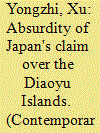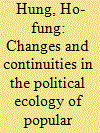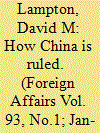| Srl | Item |
| 1 |
ID:
126409


|
|
|
| 2 |
ID:
079962


|
|
|
|
|
| Publication |
2007.
|
| Summary/Abstract |
This article will delve into the historical roots of Chinese environmentalism. A wave of recent research has unearthed numerous instances of Chinese state-society conflicts, as well as the ecological crisis precipitated by drastic population and commercial growth in 18th-century China. Based on a survey of protest events derived from archival sources, this contribution analyzes how the mounting ecological crisis and falling capacity of the Qing state in the 18th and 19th centuries generated changing forms of popular protests as responses to the "externalities of development." It is found that when the Qing's regime capacity peaked in the early 18th century, most popular protests were peaceful and were resolved through compromises between officials and protesters. Amid the administrative breakdown in the 19th century, however, many protests escalated into violent confrontations, while others developed into "appeals to the capital" (jingkong ), a litigation process that enabled local communities to seek the support of the central government in their struggle with predatory local officials. Remarkably, some repertoires and patterns of environmental protests in contemporary China can be traced back to the Qing times, which raises questions about whether today's environmental protests are completely novel, or whether certain continuities are inherent in the deep-seated tradition of state-society conflict and negotiation in China's late imperial history
|
|
|
|
|
|
|
|
|
|
|
|
|
|
|
|
| 3 |
ID:
126273


|
|
|
|
|
| Publication |
2014.
|
| Summary/Abstract |
China had three revolutions in the twentieth century. The first was the 1911 collapse of the Qing dynasty, and with it, the country's traditional system of governance. After a protracted period of strife came the second revolution, in 1949, when Mao Zedong and his Communist Party won the Chinese Civil War and inaugurated the People's Republic of China; Mao's violent and erratic exercise of power ended only with his death, in 1976.
|
|
|
|
|
|
|
|
|
|
|
|
|
|
|
|
| 4 |
ID:
149323


|
|
|
|
|
| Summary/Abstract |
What can we learn about China's future from reflecting on the country's past? If you are looking for firm predictions, history does not repeat itself, which means that even the best historical analogies only very occasionally prove reliable guides for events to come. It is tempting to say that knowledge of the past can tell us what will happen in the future, but things just do not work that way.
|
|
|
|
|
|
|
|
|
|
|
|
|
|
|
|
| 5 |
ID:
121985


|
|
|
|
|
| Publication |
2013.
|
| Summary/Abstract |
From the end of the fifteenth century, the Ming state redirected the entire flow of the Yellow River into the course of the Huai River in order the facilitate the transport of tribute grain. This shifted the major problems of water control from the middle and lower reaches of the Yellow River to the Huaibei region. Huaibei was viewed as 'a local interest', as opposed to the 'general interests' represented by the central government, and was sacrificed for those general interests. These policies, which were continued under the Qing dynasty, created widespread and frequent flooding in the region, causing short-term famine and destruction and leading to long-term economic decline.
|
|
|
|
|
|
|
|
|
|
|
|
|
|
|
|